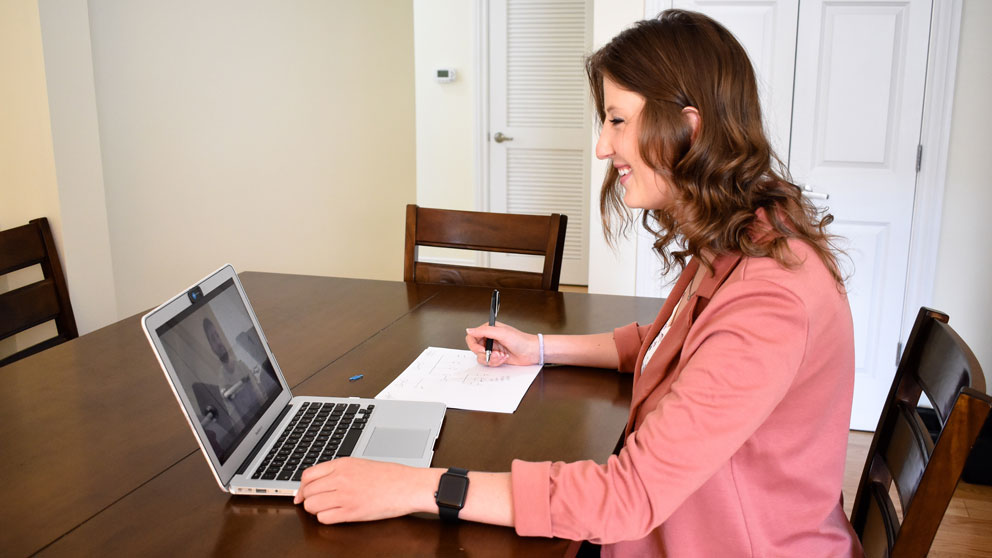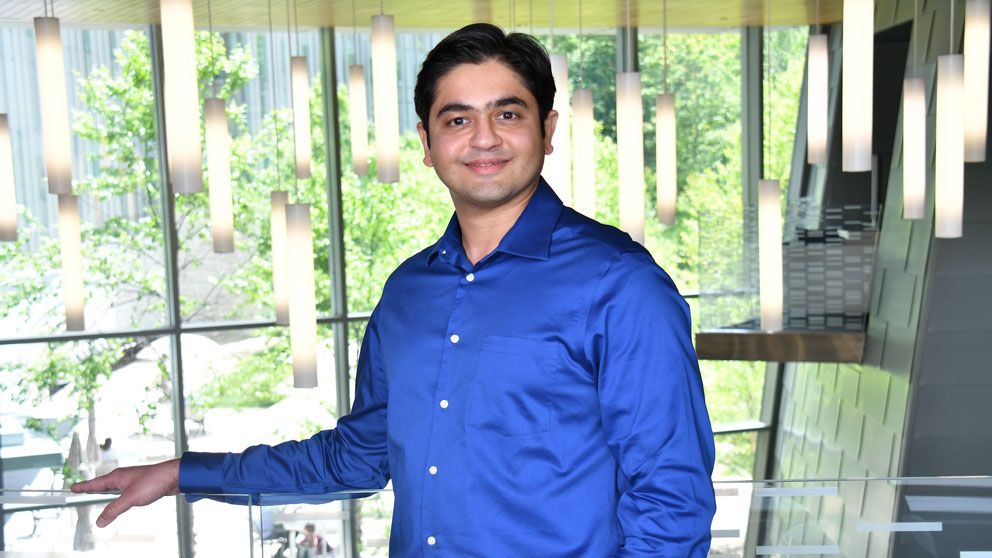
Brittany Spader talks with a colleague during a virtual meeting. Photo by Nicole Gartner.
The Global Alliance for Genomics and Health predicts that 60 million genomes will be sequenced worldwide by 2025.
Genetic testing is an increasingly common component of patient care and translational research in cancer, neurology, cardiovascular disease, and many other areas. In a world where a single genetic variation can lead to a different treatment strategy, accurately interpreting and delivering the results of genetic tests is a complex yet crucial exercise.
That’s where genetic counselors come in. These health professionals are trained to see the “human side” of genetics and help people understand the medical, psychological, and research implications of genetic contributions to disease.
Demand for genetic counselors is soaring. According to the U.S. Bureau of Labor Statistics, the field is projected to grow by 27% between 2018 and 2028, compared to just 5% across all professions. While many new master’s programs in genetic counseling have come online in the past decade, there are generally not enough training spots in clinics and hospitals, which limits the number of students who can gain the necessary clinical experience to graduate.
The Jackson Laboratory has stepped up to play a key role in training the next generation of genetic counselors. The Laboratory is hosting a handful of students each semester at The Jackson Laboratory for Genomic Medicine (JAX-GM) in Farmington, Conn., and has plans to scale that number up in the coming year.
“As genetic counselors, we give patients the power to make the decision that's best for them and their families,” says Brittany Spader, a 2020 graduate of Bay Path University’s new two-year master’s program in Genetic Counseling. The program, which includes four clinical rotations, prepares students to take on a wide variety of roles in the genetic counseling workforce — from traditional clinical counseling to working in policy or translational research settings. Spader recently completed her final rotation at JAX-GM.
“In the clinic, we have to be ready to provide emotional support to patients and families, as genetic information sometimes leads to difficult healthcare decisions,” she explains. Genetic counselors can explain test results and scientific concepts in a comprehensible, compassionate, and unbiased manner that allows patients to make clear-minded, informed choices.
Her time at JAX-GM helped her realize that scientists working in precision medicine can develop a myriad of new diagnostic tests and treatments, but they need genetic counselors as liaisons, patient advocates, and educators who help determine the best way to apply these treatments and diagnostic assays.
“When you bring clinical and laboratory viewpoints together, it really can enhance the research,” she says. Genetic counselors provide an important connection between translational researchers and the patients they are helping, giving new meaning and depth to their day-to-day work. These interactions can lead to clinical benefit, such as the development of more robust sequencing panels that excludes genetic regions that are problematic to report out.
Kunal Sanghavi, program manager of the Genetic Counseling Program at JAX-GM and Spader’s rotation supervisor, agrees, “We need genetic counselors to ask the tough questions about implementing new technologies and scientific discoveries. When should we be able to use them? What scenarios should be prohibited? Should they be used at all?”
“Genetic counselors, who are already an integral part of clinical settings, are also adept at understanding and simplifying complex scientific information and embedding appropriate ethical and psycho-social considerations to guide and manage the implementation of new technology or translational research in the clinic,” he says. “Translational science, governed through ethical principles, paves the path for a seamless clinical application.”

Kunal Sanghavi. Photo by John Atashian.
As Spader was learning these lessons, she says she was pleasantly surprised by the extent to which her rotation experience at JAX-GM was tailored to her desired goals, even in the midst of a pandemic.
“I felt like I was a priority — my education was not going to be put on the back burner,” she says. “Having that support and reassurance and knowing I wasn’t going to take a step backwards during these unprecedented times made a big impact on me.”
She wanted to focus on her research skills. Under Sanghavi’s supervision Spader conducted a critical literature review of professional development strategies in genetic counseling — an as-yet understudied area — and presented her findings to the planning committee for the Connecticut Genetic Counselors Association. Her report highlighted the importance of fostering interdisciplinary collaborations with the research community. She also participated in Maine Cancer Genomic Initiative genomic tumor boards and discussions regarding genetic counselors’ role in public health decisions.
These experiences not only built up skills that Spader will use in the clinic, but have also made her a more well-rounded genetic counselor, able to partner with laboratories and policy makers to influence the future of genetic testing and precision medicine. She says one of the most important things she learned from her rotation at JAX-GM is to be unafraid of expanding her scope beyond direct patient care into areas such as education, advocacy, policy, or genetic research.
“Having this rotation at JAX highlighted that I shouldn’t stay stagnant in a direct patient care role — there are other ways for me to develop professionally,” she says. “Being at JAX opened my eyes to all the other possibilities available for genetics professionals.”
As genetic counseling grows in recognition and applications, Spader wholeheartedly recommends that anyone with an interest in genetics pursue it as a career.
“This field is changing, and it’s not going to slow down anytime soon, especially because technology is evolving so quickly,” she says. “There’s a lot we don’t know that will be discovered. We’ve only scratched the surface.”